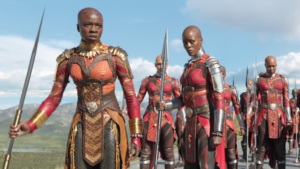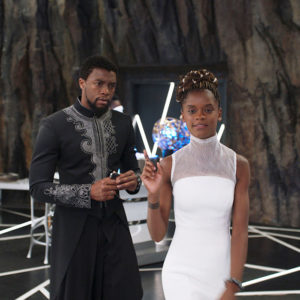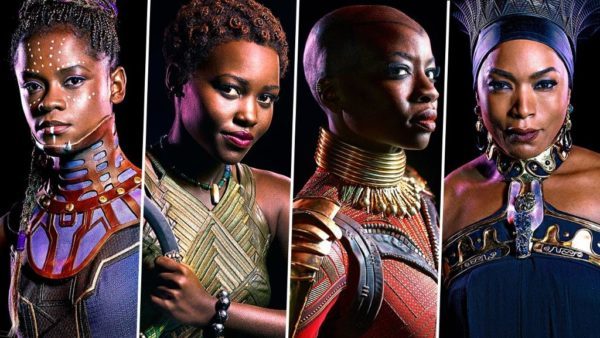The power of women
There will be spoilers. If you haven’t seen Black Panther, stop doing what you’re doing right now, buy tickets, and go see it.
In Black Panther, one of the clearest and most undeniable themes is the power of women. As I talked about vaguely before, the Black Culture in America, and I assume many cultures in Africa, is matriarchal. This was so clear and so apparent in this movie. Interestingly enough, even as I watched it, understood, and felt the same way, it felt odd at the same time. That shows that it’s unfamiliar for me to see a matriarchal structure on screen. Because most movies are based around white Americans, the system typically portrayed in movies patriarchal: the things that happened in this movie would have never happened in a standard American film.
“They won’t knock again.”

Who really has the power? Women.
There were so many moments that made it clear that regardless of the fact that King T’Challa was ”in charge”, in reality, the women held the power. Firstly, let’s take a look at the Dora Milaje, the all-women Army underneath king to color. Every Warrior is extremely well-trained and very, very loyal.
We spend most of our time with the general, who we see is confident and strong, loyal to the death, proud of her heritage, and can give a good joke. We also notice that she doesn’t hesitate for what she believes is right, can be a bit rash, and always has her heart in the right place. Okoye is No-Nonsense, big-hearted, committed, and loves deeply. Her army is a royal army: they protect their King and their people. Okoye often gives T’Challa advice throughout the film. She protects him and ultimately it’s her steadfast loyalty to the crown, even in the face of having to kill her own beloved, that stops the bloodshed during the main fight.
Then you have Princess Shuri. The 16-year-old engineer who creates all the technology for Wakanda. She’s spunky and high-spirited, dislikes tradition, but is also not afraid to do what is necessary for her country. When Shuri is questioned, it is more because of her age than because of her gender. In a white movie, her gender would have come up questioning if can she could handle creating all this technology. M’Baku simply questioned her age and whether or not she was too young to be in charge of such a large project. It is her ingenuity that truly sets her apart from women in other movies. It’s is clear that she is well respected in general and only her mother, her matriarch, has the ability to take her in hand. I adore that she is a complex woman who is also powerful, loving, and very intelligent.

In this movie, women are warriors in every tribe. They are elders in tribes and hold positions of power. They tend to one of the most mystical portions of their culture and they are not only the caretakers of their community but they also have incredibly strong leadership roles.
Without them, Wakanda could not exist.
Men defer to women regularly in this movie, and it does not feel contrived: it feels like the natural Order of Things.
Even if men are the face of the outside world, it is ultimately the women that give direction and provide the strength to push forward when everything is against them. They provide the loyalty that keeps their culture together.
Although I’m not exactly sure how else they would have made that, I’m incredibly grateful that it showed up in this way. This is as natural to me as breathing, and I would have found myself distressed to be watching a movie about Black people where the women were relegated to side roles, only to be the love interest we ogle. These women were strong and unique in their own ways and had their own reasonings for their decisions and actions. Even without the heart-shaped herb they were shown as equals: that’s the way it’s supposed to be. If you dance African American vernacular partner dances, pay attention to the gender roles and the way they show up in Black Panther.
If you liked this piece be sure to check out the other parts of this series! Up next we talk about the role that parents play in the film.
Editors Note: This post was originally published March 2018 and has been updated for clarity.
